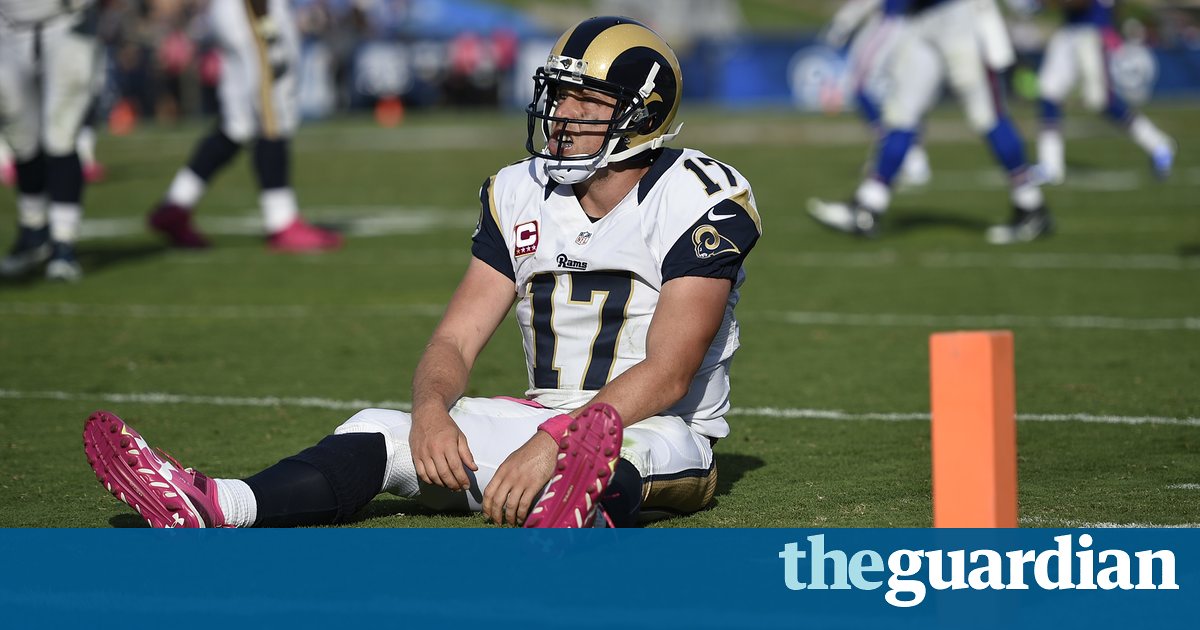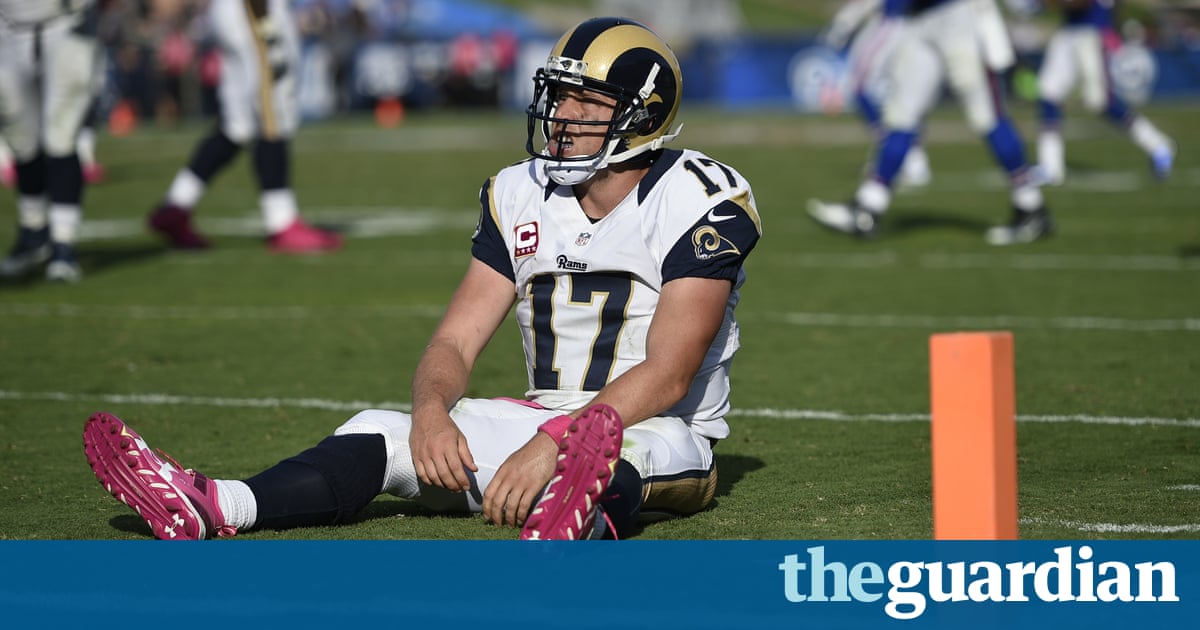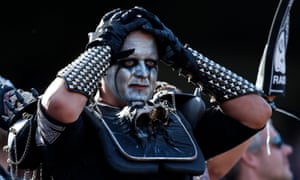Mediocrity on turf: the NFL is stumbling, but will it recover?

Television ratings are down in Americas most popular league. And poor play, cable cutters and player protests have all been blamed

As the owner of the New Jersey Generals in the short-lived United States Football League, Donald Trump took on the NFL and lost. More than 30 years later, the mogul may have extracted an accidental revenge on the worlds most lucrative sports league via his presidential election campaign.
Through week four, the NFLs television ratings were down by 11%. In an internal memo dated 6 October and obtained by several media outlets, two league executives floated an explanation.
There is no question that unprecedented interest in the Presidential election is impacting primetime ratings – this was clear when Monday Night Football went head to head with the first presidential debate on 26 September, the memo read.
The effect of the presidential election on NFL ratings has been seen before: in 2000, during the campaign between George W Bush and Al Gore, all four NFL broadcast partners suffered year over year declines.
This seasons dips, though, are dramatic. The NFL game scheduled against last months first presidential debate was down by 40% compared with the game at the same time last year, USA Today reported. For the second debate, which had a lower audience, the NFLs viewership declined by 20%.
Its transcended news and become entertainment, said Michael Cramer, a sports and media programme director at the University of Texas. If there is a competition between a debate and a football game, I feel compelled in this election to watch the debate, at least part of it Im not happy with the content but its clearly almost entertainment. You would never say that about a debate between George Bush and Al Gore.
The theory that Clinton v Trump has siphoned attention from the likes of the Green Bay Packers v the New York Giants will be easier to measure once the election is finally over. More subjective is the impression that while politics may be unusually captivating this year, the NFLs storylines are less enjoyable than usual. Roger Goodell, the commissioner, told reporters last week that he believes the league has not lost viewers, but they may not be watching for as long as they used to.
In an impatient culture with many entertainment options, one risk is that fans conclude that a competition where three-hour matches might contain 11 minutes of actual play is best enjoyed through highlights on social media, especially if a lack of narratives and drama erodes the sense of a fixture as viewing that demands to be seen live and in full.
Theres a lack of compelling product on the field this year, which is not unusual you have slow baseball seasons and slow NBA seasons and slow NHL seasons and weve had NFL seasons in the past which havent exactly been the greatest. And I think people notice that, Cramer, a former president of the Texas Rangers MLB team and Dallas Stars NHL franchise, said.
Some seasons just dont have a compelling story, and if you asked me what the compelling story was in the NFL this year Id kind of have to put my feet up and think about it. Theres no compelling game, theres no compelling on-field story. There are a lot of stories off the field that are eating up news time and broadcast time and none of them are particularly favorable for the league.
No teams remain undefeated, leaving some to wonder whether parity is a synonym for mediocrity. Last Sundays 6-6 tie between the Seattle Seahawks and Arizona Cardinals was a primetime festival of incompetence. In four of the leagues eight divisions, only one team has a winning record. Several franchises are stagnant; the only way the league has been able to generate buzz around the Jacksonville Jaguars is by dispatching them to a different continent; last years most entertaining team, the Carolina Panthers, are struggling badly.
The absences of two famous quarterbacks have been felt, with Peyton Manning retiring to pursue his true calling, acting in commercials, and Tom Brady of the New England Patriots and the first-class carriage of the Trump Train suspended for four games thanks to the Deflategate saga (since his return, Brady has been excellent but, at the age of 39, he is hardly an exciting new talent). The league is becoming younger, which may be adversely affecting the quality of play as inexperienced players struggle to adapt to complex gameplans.
San Francisco 49ers quarterback Colin Kaepernick has been the highest-profile player of the season not for his performances, but his refusal to stand for the national anthem in protest against racism and police brutality. Some commentators have cited his actions as a contributing factor to the ratings slide, suggesting that fans are turned off because their escapist fun is being politicized. Fans seem to agree, too: a poll this week found 56% of those surveyed thought player protests had contributed to the drop in ratings (although crucially the poll did not ask whether the respondents themselves had been put off by the players actions).
Is it so hard to imagine that a majority-conservative, NFL-watching fanbase might have issue with an overpaid, overrated child of privilege putting his ill-conceived look at me campaign over and above the national anthem? opined a writer for the rightwing website Breitbart.
This claim was dismissed by the NFLs memo, and football fans have previously stuck by the league amid domestic violence scandals, inept officiating, and a concussions problem so alarming it was turned into a Will Smith movie.

Its not just fans who are turning away. Players seem increasingly disgruntled with a league that cracks down on seemingly small infractions, such as touchdown celebrations something the Seattle Seahawks cornerback Richard Sherman addressed this week in a post on the the Players Tribune:
TV ratings are down, and I think we can point to the NFL legislating the emotion out of the game as a contributing factor, Sherman wrote. The NFL is enforcing a policy against celebration. Against joy. Against fun. Its something I know a lot of players are frustrated with, and it appears that fans may be as well.
I think the hardcore football fans are still watching the NFL and always will. I believe it is mostly the casual fans, those who simply look at the NFL as entertainment, who have cut back on their viewership, said Clark Haptonstall, a sport management professor at Rice University, citing the national anthem protests and concussion concerns as possible reasons. When big hits occur during a game, the casual fan cringes because they know about the health problems that could be coming down the road for that player, he said.
The legal struggles and reduced promotional activities of two big daily fantasy sports sites, DraftKings and FanDuel, may have prompted the unwinding of the fantasy sports bubble and turned off viewers, according to a report from MoffettNathanson, a research company.
All the same, with every NFL team enjoying attendances averaging more than 80% of stadium capacity, and almost all above 90%, supporters are still packing the stands. Regional broadcast ratings remain strong. But if it continues, the national ratings slide will challenge the NFLs image as a bulletproof property in a state of perpetual growth, with each colossal broadcasting contract worth more than the last.
Major networks placed long-term, multi-billion dollar bets that in the age of video on-demand on multiple devices, live sport, and especially the most popular sport in the nation, would continue to be irresistible to advertisers and subscribers.
Of course, its possible that scenarios specific to this season have exacerbated a fade that says more about the state of cable television than the sport. The NFLs memo aimed for a reassuring tone. Over the past 15 years, it soothed: NFL viewership has increased 27% while primetime broadcast viewership has decreased 36%.
This, though, raises the question of how the biggest fish can continue to thrive in a shrinking pond. As Awful Announcing noted in June, ESPNs reach has fallen from 99 million subscribers in 2013 to an estimated 89.5m last summer, and Fox Sports 1 and NBC Sports Network also trended downwards.
In the UK, ratings for some Premier League and Champions League soccer games have recently sunk by 20-40%, with broadcasters arguing and no doubt praying that this is a blip with logical explanations, such as match-ups with limited appeal, rather than a sign that the competitions have peaked.
In a media market where prices are pushed up by bidding wars and fear of missing out, there may be a time when rising costs and decreasing returns create a point where the gaudy numbers no longer make sense. And, as newspapers have found, embracing social media and internet distribution can boost content consumption, but it is not easy to monetize them.
[The NFL] still continues to be head and shoulders above other categories of sports programming in terms of ratings and viewership, said Lee Berke, a sports network development specialist. He pointed out that although changes are afoot for next year, a leading ratings measurement service, Nielsen, does not yet track out-of-home viewership, which has grown as technology has evolved to make it easy to watch TV on portable devices.
I think its a short-term issue and its based on specific issues in terms of how you measure audiences. Because in part youve got audiences now that are consuming NFL games and other sports content across a number of screens, and the measurement data doesnt capture all that, he said. I thought media rights were starting to crest 10 years ago and I wasnt alone. And yet theyve continued because for all of its challenges, all of the cord-cutting, all of the seeming decline across the board, [the NFL] is still compelling television youve heard the phrase appointment television, Cramer said.
He believes the NFLs future prosperity is less a matter of technological change than of potential cultural shifts. Will we still be sports-obsessed in a decade or two? People want to watch a sports event on the biggest, best, screen available. The real question is: will we maintain an interest in sports as a society the way we have grown it over the past 50 years? And I think right now thats still very much up in the air, Cramer said.
Amid all the leagues challenges, shortcomings and competing pastimes, he said, viewers may just say: I dont need it.
Read more: https://www.theguardian.com/sport/blog/2016/oct/28/nfl-football-tv-ratings-drop